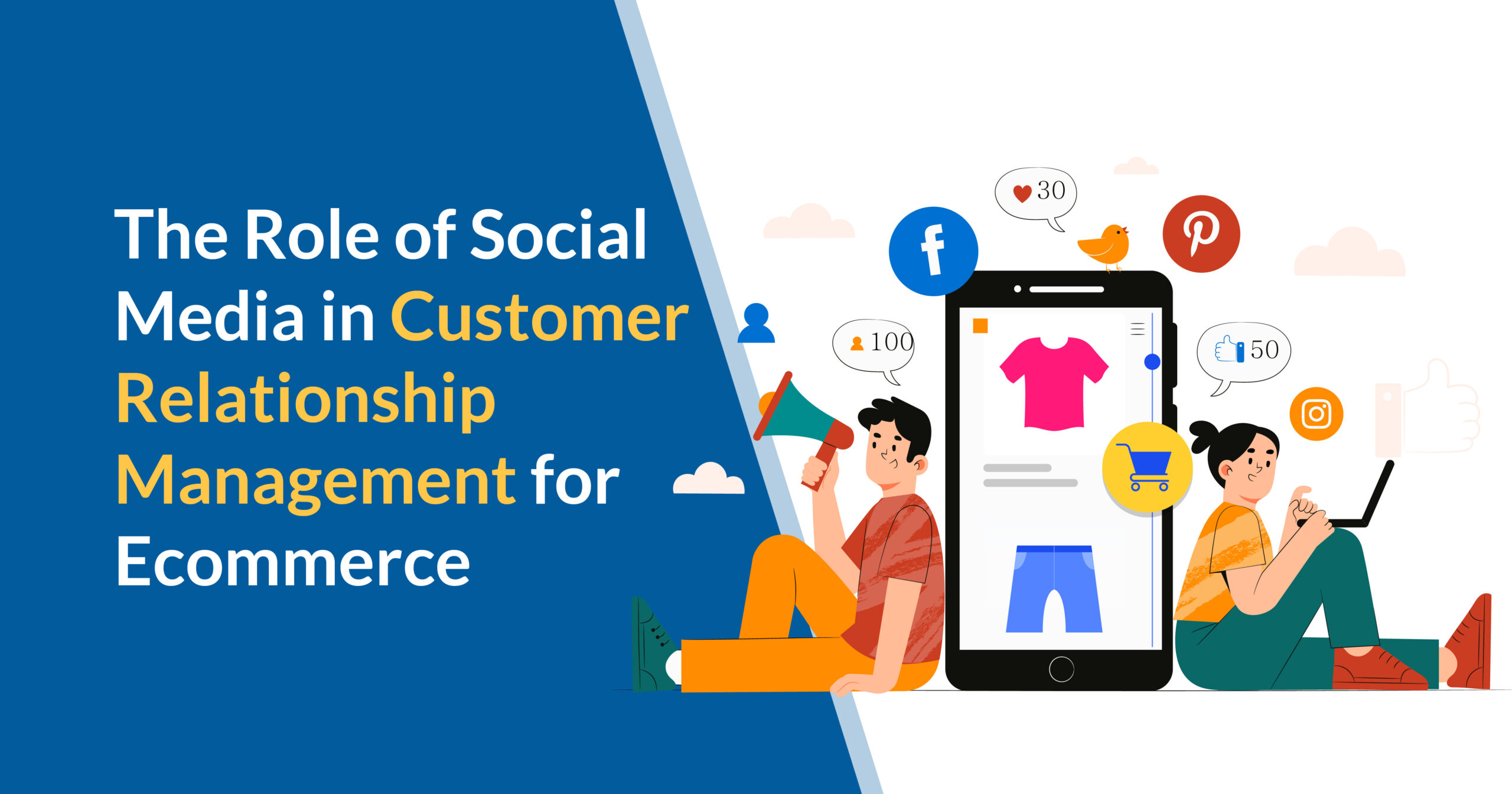In the rapidly evolving landscape of modern business, Customer Relationship Management (CRM) holds utmost importance for Ecommerce businesses. CRM encompasses strategies and practices to build, nurture, and maintain meaningful relationships with customers, fostering loyalty and long-term success. As the digital age progresses, the integration of Social Media has become a game-changer. Providing Ecommerce businesses with a powerful platform to engage with their audience, understand customer preferences, and deliver personalized experiences. This introduction explores the pivotal role of Social Media in CRM for Ecommerce, shedding light on its significance and the potential it offers for businesses to thrive in the competitive online marketplace.
Understanding Social Media in Ecommerce
Social media has revolutionized the Ecommerce landscape, transforming customer-business interactions and marketing approaches.
- Social media plays a pivotal role in Ecommerce, reshaping customer-business dynamics.
- Familiarize yourself with popular social media platforms used in Ecommerce.
- Explore compelling statistics and trends showcasing the impact of social media on Ecommerce.
- Discover the diverse benefits of incorporating social media into Ecommerce CRM.
- Enjoy heightened customer engagement, amplified brand visibility, and data-driven insights.
- Personalize marketing strategies for improved results and growth.
- Leverage the transformative potential of social media in advancing your Ecommerce venture.
Leveraging Social Media for Customer Engagement
Effectively foster customer engagement by leveraging social media. Cultivate a robust online presence to connect with your audience and provide real-time customer support by addressing queries promptly. Encourage meaningful interactions on social media platforms through strategic approaches. Promote your brand authentically by harnessing the power of user-generated content. Engage customers with contests, polls, and interactive content, while promptly responding to comments and feedback to foster loyalty. Showcase satisfied customers through user-generated content, building trust and empowering them to share their experiences for organic brand promotion. Capitalize on social media’s vast reach and influence to boost customer engagement and advocacy.
Social Listening and Customer Insights
Social Listening and Customer Insights are essential for businesses to stay attuned to their customers’ needs and preferences. Through social listening tools, companies can track conversations, mentions, and sentiments surrounding their brand on social media. Monitoring customer sentiment on these platforms allows businesses to gauge customer satisfaction and address concerns promptly.
Extracting valuable customer insights from social media data enables businesses to identify trends, preferences, and pain points, helping them make data-driven decisions and tailor their strategies for better customer engagement and retention. Social listening empowers businesses with a deeper understanding of their target audience, facilitating the development of more relevant and customer-centric offerings.
Personalization and Targeting through Social Media
Personalization and targeting are integral to effective Ecommerce Customer Relationship Management (CRM) strategies via social media. Personalized marketing is crucial for engaging customers and tailoring content to their individual preferences, needs, and behaviors. By leveraging social media data, businesses can gain valuable insights into customer interests, behaviors, and purchase history, enabling them to create targeted campaigns and deliver relevant messages. Personalization not only enhances the customer experience but also increases brand loyalty and drives higher conversion rates, resulting in improved customer retention and overall Ecommerce success.
Using social media data to understand customer preferences
Utilizing social media data is vital for understanding customer preferences and optimizing personalization and targeting efforts.
Businesses can gain valuable insights into customer preferences by analyzing interactions, interests, and behaviors on social media platforms. These insights enable tailored content and promotions that resonate with customers, leading to more effective marketing campaigns and improved engagement. Understanding customer preferences through social media data fosters stronger connections and enhances overall Ecommerce performance.
Implementing targeted advertising and messaging on social media
Implementing targeted advertising and messaging on social media is a powerful strategy for Ecommerce businesses to reach their desired audience effectively. By using data-driven insights from social media platforms, businesses can segment their target market and create personalized. Ad campaigns tailored to specific demographics, interests, and behaviors. Targeted advertising allows businesses to maximize their marketing budget by reaching the right people with the right message at the right time.
This approach not only increases the chances of conversion but also enhances the overall customer experience by delivering relevant content that resonates with potential buyers. Through strategic targeting, businesses can boost their brand visibility, drive higher engagement, and ultimately achieve better returns on their social media marketing efforts.
Social Media as a Sales Channel
Social media has emerged as a prominent sales channel for Ecommerce businesses, offering unique opportunities for growth. Integrating social commerce with Ecommerce platforms allows businesses to seamlessly sell products directly through social media channels, tapping into a vast user base. Implementing effective strategies for driving sales through social media involves creating engaging content. Leveraging influencer marketing, and running targeted ad campaigns. Measuring the impact of social media on Ecommerce sales is crucial for evaluating the success of these efforts. Analyzing metrics such as conversion rates, click-throughs, and revenue generated through social media referrals. By optimizing social media as a sales channel, businesses can expand their reach, boost sales, and capitalize on the platform’s immense potential for Ecommerce success.
Customer Retention and Loyalty Programs on Social Media
Customer retention and loyalty programs on social media are pivotal for sustaining Ecommerce success. Building customer loyalty through engaging social media interactions helps foster lasting relationships, encouraging repeat purchases and brand advocacy. Designing effective social media loyalty programs, such as reward points, exclusive offers, and referral incentives, entices customers to stay loyal and active. Case studies showcasing successful social media-driven loyalty initiatives demonstrate how businesses have achieved remarkable results in retaining customers and boosting brand loyalty. Utilizing social media to nurture loyalty ensures that customers feel valued and connected. Fostering a strong and loyal customer base for long-term growth.
Handling Customer Feedback and Complaints on Social Media
Effectively handling customer feedback and complaints on social media is essential for maintaining a positive brand reputation. Implementing best practices involves responding promptly, acknowledging feedback, and offering solutions publicly to demonstrate a customer-centric approach. Dealing with negative comments and complaints constructively entails empathizing with customers, apologizing when necessary, and resolving issues with transparency and professionalism. Social media provides an opportunity to turn negative experiences into positive outcomes by addressing concerns openly. Offering discounts or compensations, and showcasing genuine efforts to improve. By showcasing exceptional customer service on social media, businesses can build trust, loyalty, and a positive brand image, even in challenging situations.
Social Media Metrics for CRM Evaluation
Social media metrics play a crucial role in evaluating the success of Customer Relationship Management (CRM) strategies. Key performance indicators (KPIs) such as engagement rates, click-through rates, and conversion rates help measure the impact of social media CRM efforts. Utilizing tools for tracking and analyzing social media performance enables businesses to gather valuable data on customer interactions, sentiment, and reach. By leveraging this data, businesses can make informed decisions to refine their CRM strategies. Optimize content, and tailor their approach to better meet customer needs. Utilizing social media metrics empowers businesses to enhance customer engagement, build stronger relationships, and achieve measurable results in their CRM initiatives.
Future Trends and Challenges in Social Media CRM for Ecommerce
The future of Social Media CRM for Ecommerce holds exciting trends and challenges. Emerging technologies like AI-driven chatbots, virtual reality, and augmented reality are set to revolutionize customer interactions and personalized experiences. However, as these innovations advance, addressing privacy and data security concerns becomes paramount to maintain customer trust and compliance with regulations. Looking ahead, predictions suggest that social media will become an even more integral part of Ecommerce CRM. With platforms evolving into comprehensive shopping channels. Brands will need to adapt their strategies to leverage the potential of social media for seamless shopping experiences and stay ahead in the competitive Ecommerce landscape.
Conclusion
In conclusion, social media plays a pivotal role in Ecommerce Customer Relationship Management (CRM). It offers unparalleled opportunities for customer engagement, personalized marketing, and data-driven insights. By leveraging social media, businesses can enhance brand visibility, foster customer loyalty, and boost sales. Embracing and adapting to social media’s ever-evolving landscape is crucial for Ecommerce businesses to stay competitive and relevant in the digital age. As consumer behavior continues to shift towards online platforms. The integration of social media into CRM strategies becomes even more imperative for sustainable success. By harnessing the power of social media, Ecommerce businesses can build strong and lasting relationships with their customers. Creating a loyal and satisfied customer base that drives long-term growth and profitability.




